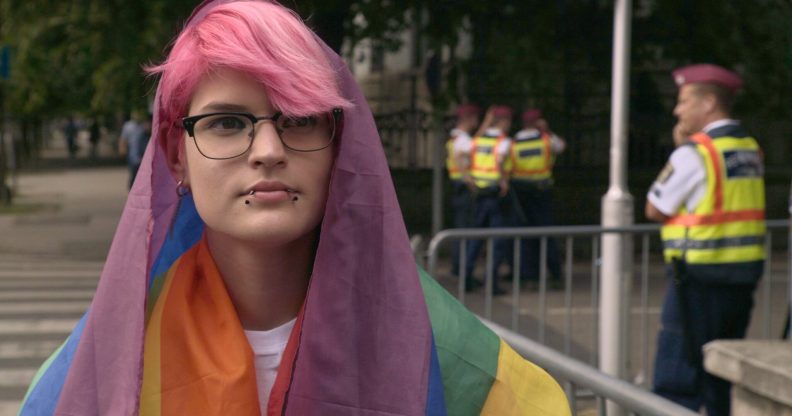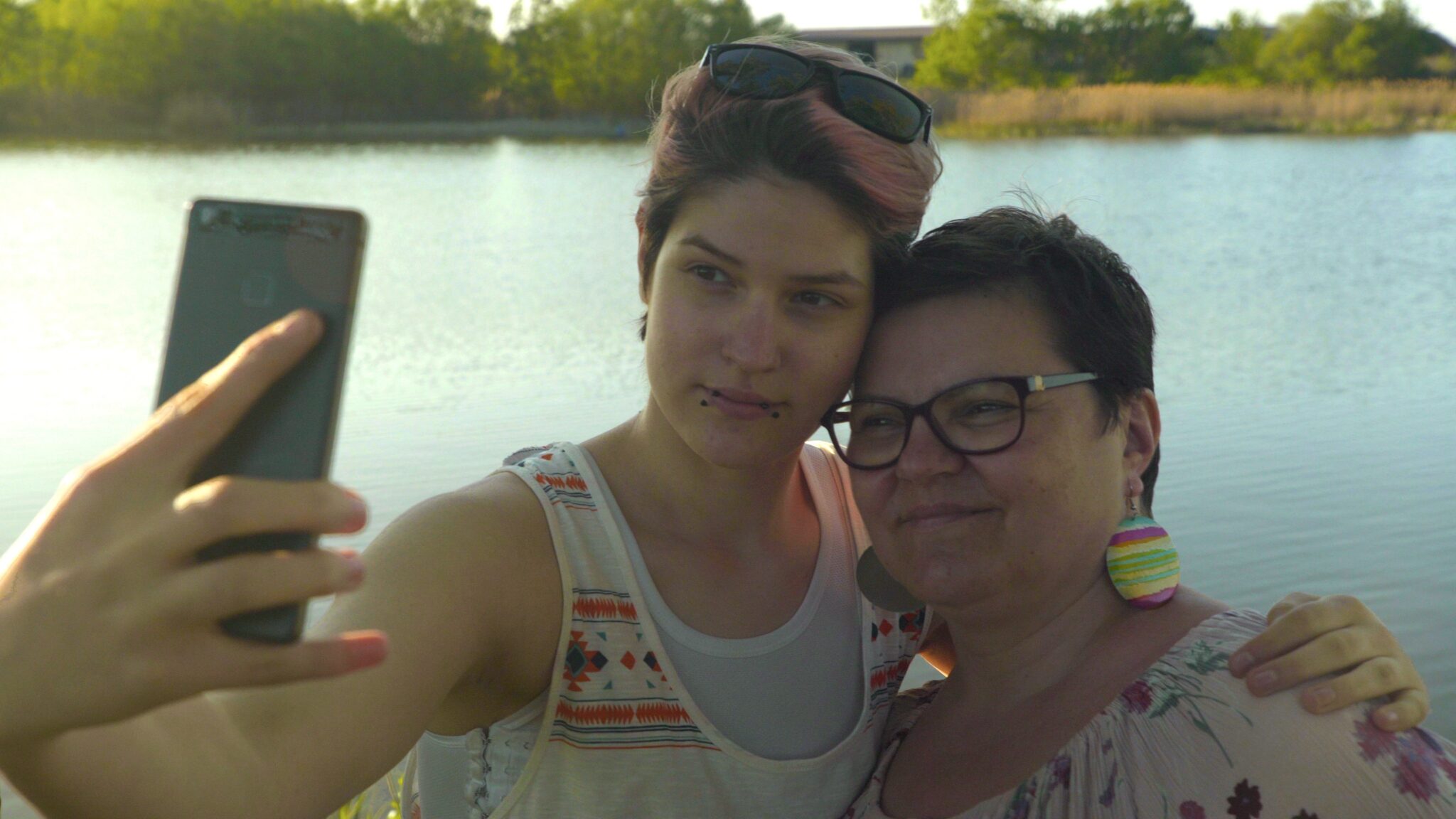Powerful film about a non-binary teenager living in transphobic Hungary will break your heart for all the right reasons

Tobi draped in a Pride flag in Hungary. (BFI Flare)
In 2020, the far-right Hungarian government moved to erase transgender and intersex people by taking away the right to change their legal name or gender.
Prime minister Viktor Orbán used emergency coronavirus powers to strip trans rights via a devastating law known as Section 33, leaving many trans and non-binary Hungarians feeling that they had no choice but to begin making plans to flee the country.
And as the pandemic went on, further homophobic and transphobic attacks – against same-sex adoption, equal marriage, trans kids and books with queer themes – meant that countless LGBT+ people in Hungary started making the difficult call to emigrate.
Along with Poland and the UK, Hungary has been repeatedly named by the EU and other bodies as one of most difficult places to be trans in Europe. A small piece of hope arrived this month, when Hungary’s top court threw out Orbán’s attempt to retroactively deny legal status for trans people – a dehumanising attempt that would have meant those who changed their legal name and gender before Section 33 was enacted would have been forced back to using their deadname and incorrect gender.
This small victory means that Section 33 cannot apply to any trans people who legally changed gender before May 2020 – and that includes the protagonist of Colors of Tobi, a documentary that had its world premiere at BFI Flare, Europe’s largest LGBT+ film festival.
In fact, the movie opens with Tobi and their parents sat around their kitchen table, filling in the government forms to legally change Tobi’s name and gender. Later we see their joy when the change becomes official.
Colors of Tobi is about the life of a trans teen in a small Hungarian village, following them over four years as they come out to their parents – first as a trans man and then as non-binary – go to Pride, revise for exams, turn 18 and leave home. But more than transness, this is a documentary about family. Tobi’s parents, Éva and Zoltán, love and support them but, at times, don’t know how best to do that and clearly feel out of their depth.
Among many heartbreaking moments, some stand out: when Tobi’s parents go to Pride to support their child, wearing matching rainbow bow ties; the many times Zoltán, a quiet man, gives Tobi a bear hug and calls them “cockatoo”; and the obvious relief on Tobi’s mum’s face when she learns her child doesn’t want to get top surgery after all. It is the candidness with which Éva’s struggle to understand and accept Tobi’s changing gender – and particularly her difficulty in letting go of the dreams she had for her child before they came out as trans – that break your heart the most.
Tobi, now 21 and working at Lush – “Which is really great, because it’s a workplace where I can be not ashamed of my identity” – spent four years being followed by a film crew, led by director Alexa Bakony (Colors of Tobi is Alexa’s debut feature-length documentary, and was supported by the Sundance Institute and the National Film Institute Hungary).
Looking back on that time now, Tobi says they feel very grateful to have had that time in their life documented and very happy about the documentary, but that they sometimes “want to punch myself in the face for not being mature to my family”.
“But I guess that’s the whole point of being a teenager,” they continue. “And I think the film has a really strong message. I can see two audiences who will enjoy the movie – one is struggling LGBTQ teenagers wanting to be themselves, and the other is a supportive family who doesn’t truly know how to support their child.”
What advice would Tobi give to those who are struggling? “Just be patient,” they say. “It takes a lot of time to fully know yourself and what you are dealing with in your life and who you really want to be, what’s your identity or sexuality because it feels like it’s always changing a little bit.
“So, you need time to accept yourself and your new feelings, your new struggles in life. So I would say be patient, with yourself, but also with everybody around you.”

Tobi with their mum, Evá. (BFI)
Tobi’s teenage moods are gently captured by the documentary, which follows what Alexa calls the “emotional arc” of the events in Tobi’s life rather than their chronological order. This becomes immediately apparent when you watch Colors of Tobi, as Tobi’s many, many hairstyles – a queer rainbow of pinks, purples, bleaches, mullets, and undercuts – flicker back and forth, out of time with the telling of the story.
“It was a bit weird that we are jumping back and forward in time,” Alexa says. “But the feeling… they said they it gave back the reality of the experience.”
This sensation of transition being non-linear, of gender identity that can evolve and change over time, is at odds with the mainstream narrative of transitioning from an “assigned gender at birth” to a “true gender”. But it’s Tobi’s experience, and while their story is very much their own, in some respects – like having a loving, supportive family but an increasingly transphobic government – it speaks to a trans experience shared across borders.
Watch Colors of Tobi on BFI Player as part of BFI Flare, available until 28 March.

